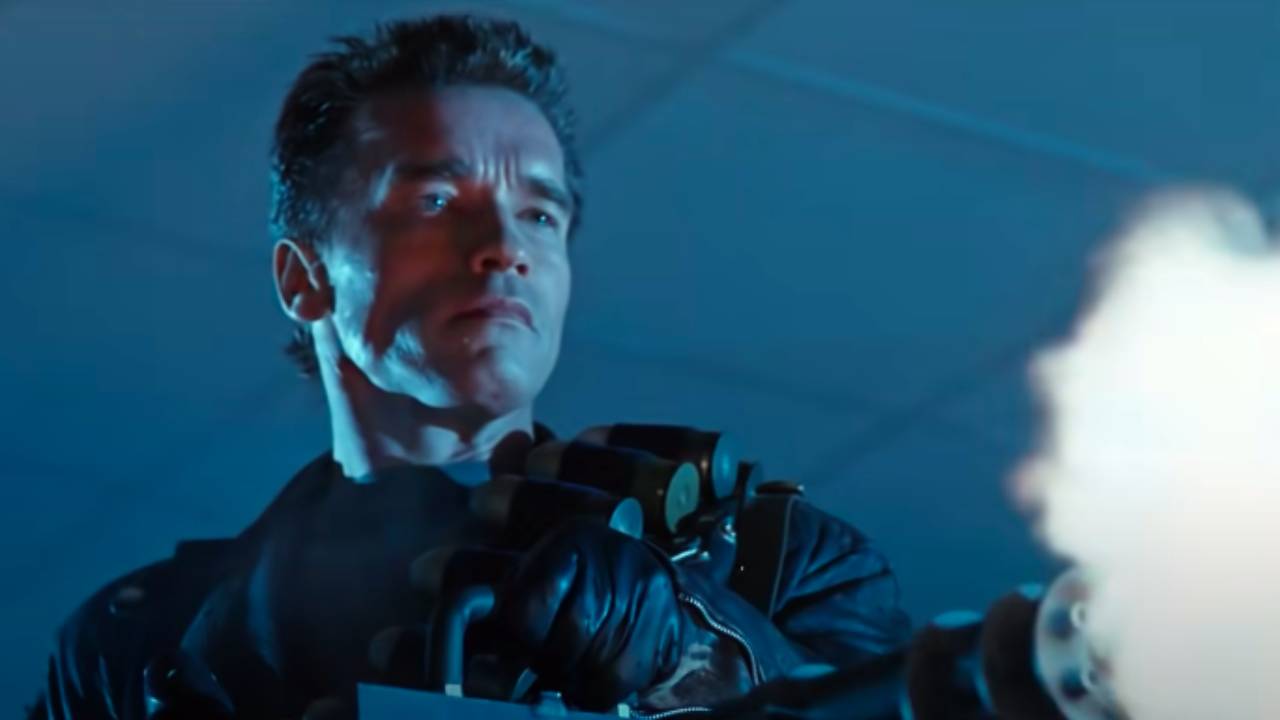The Trouble With Bliss Star Michael C. Hall Talks Going From Serial Killer To The Unspectacular
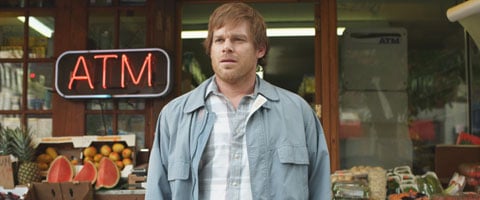
Nowadays we all know him as our friendly neighborhood serial killer, Dexter, but even Michael C. Hall himself admits “there’s more to acting than playing a serial killer.”
In the upcoming release The Trouble with Bliss, Hall stars as Morris Bliss, a guy in his mid-30s who calls his widowed father’s (Peter Fonda) apartment his own and actually bunks down in what looks to be his childhood room. Oddly enough, rather than date someone his own age, Morris falls for an 18-year-old student (Brie Larson) who just so happens to be the daughter of an old high school pal (Brad William Henke).
Morris is a pretty interesting specimen. He’s got hopes to make big moves, but seemingly lacks the motivation to do, well, much of anything – quite the opposite of Dexter. In honor of The Trouble with Bliss’ March 23rd limited release, Hall took the time to discuss his Dexter detox, his experience playing a more reactive character, working with writer-director Michael Knowles and much more. Check it all out in the interview below.
This film went through a fairly lengthy preproduction process. Were you on board the entire time?
Michael C. Hall: Yeah, I guess we shot it in the early spring. Initially we were going to do it in the previous fall and it in part didn’t work out because I got sick. But I stayed in touch with the director and they waited for me and reconstituted it all with I think an even better group of actors and so it turned out to be worth the wait. But yeah, as far as the actors go, I think I was the first person on board.
What made you think The Trouble with Bliss was worth sticking with?
I loved that it was a chance to go back to New York and work in the neighborhood I first lived in. I actually lived on East 5th street where Morris lives. I really liked the script, I really liked the character, I relish the opportunity to play someone who is really unspectacular [laughs], who is not uniquely afflicted or remarkably capable in any way. After spending so much time playing Dexter, that was a nice change of pace.
Your Daily Blend of Entertainment News
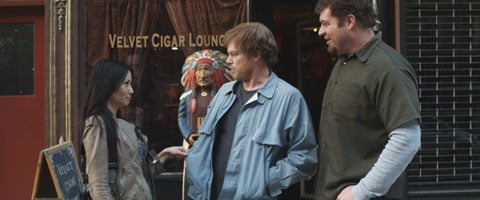
You've somewhat lived in Dexter's mind for about six years now, so do you need to go through a Dexter detox to be able to inhabit another character?
Yeah, I think so. I think just getting off the wheel [laughs], the Dexter wheel, does a lot of my work for me, taking a trip, just getting some time away form it. But I think encountering another character and doing something else really just goes a long way to reminding myself that there’s more to acting than playing a serial killer.
What's the very first thing you like to do when you get a new role? Do you have any sort of routine?
I think the first thing I try to do is read and re-read and re-re-read the script. That’s sort of the road map. And if I’m playing someone who is a real person or was a real person, I’ll do whatever investigating I can to find out about them. Or if I’m playing a person who has some sort of occupation, I’ll try to familiarize myself with what that’s all about. And I think that kind of research is helpful to ground you, but I think ultimately what’s required and the fun of it is the imaginative leap, just the magical what if or as if. What if I were this person? What if these were my given circumstances?
How about for Morris specifically? Is there anything you did for him that you’ve never done before?
I had the luxury of working with people I knew previously and I had the luxury of just hanging out with Chris Messina and Brad Henke in LA and also doing some rehearsals with Brie [Larson]. It’s also something that initially was happening several months before we actually shot it so in that sense I just had so much more time to let it simmer in the oven, you know? I wasn’t living with my widowed father or anything, but I certainly was living with very little money in that very neighborhood when I was just starting out in New York, so I suppose I imagined that all that time I’d spent was good soiling with which to plant the character.
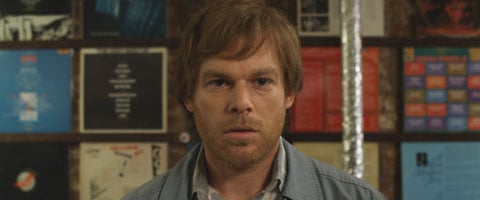
I wouldn't say Morris is a man on a mission in this movie; it's more of a slice of life piece and about just seeing what move he makes next. Is that something that gives you more freedom when portraying a character?
Yeah. I think he described himself as craving direction, but also without direction and as a result it makes him more reactive. He has a sense of openness I think to experience or the possibility of experience and isn’t so directed or compelled. He’s more there to just be open to and listen to and witness whatever comes up for him so that’s sort of a different place from which to operate.
What’s going through your head while on set and just playing him reacting? Are you actually digesting what the other character is saying or doing or are you maybe thinking about direction Michael had just given you?
It varies. You are the horses, you are the chariot, you are the person driving the chariot and at any given moment you’re sort of in one of those three places and ideally some percentage of you is everywhere. It’s hard to say at any given point. You certainly think about what a character is after and try to focus on those things, but as in life, our mind is not always focused. [Laughs] You’ve got to tolerate whatever does or doesn’t come up.
Oh, do I know what you mean! So how about working with Michael? What kind of actor's director is he?
I think he is an actor’s director. Michael spent time as an actor earlier in his career and really, as a result, I think knows how to talk to actors, what to say, what not to say, how to say things simply, how to give suggestions that are really constructive and actable and not vague and esoteric. That was very much appreciated especially on an independent film budget and schedule where you don’t have the time to luxuriate in the myriad of possibilities. You kind of need to make a decision and move forward, so he was great in that sense. And he also just created a really playful and relaxed atmosphere on the set, which I think we all really appreciated.
He’s also an experienced cinematographer and editor, too, so did you notice that helping him at all?
Yeah, he’s cutting the movie in his mind probably as he was directing it and maybe knew what we did and didn’t need as far as his editorial take on what the film would ultimately look like, so it probably made for shorter days. [Laughs]
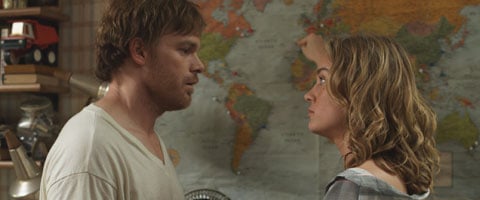
How many takes were you doing? Did he know what he wanted, get it and just move on?
It’s funny, I think he was to a degree open to being surprised and everything, but I think he knew the story that he hoped to tell and once he was assured he had what he needed, he moved on. No more than two to four takes and sometimes fewer and sometimes, you know, you’re talking about four takes of a scene that plays in one shot, so it’s kind of like which full ride are you gonna go with?
How does that compare to working on a show like Dexter? It's TV, so you're still churning out episodes pretty quickly, but I imagine you might have a little more room to breathe there.
I would say the pace is comparable really. The difference is that on the TV show we’re dealing with sets that we built, that our crew had worked on, that we know how to light, the crew at this point has a groove that they’re in and the actors all know their characters very well. On something like this we’re just jumping in in the deep end and there are so many more variables beyond your control and it’s a little less luxurious in terms of where you hang out between scenes or the craft service table, but it’s nice to be reminded of just how little you do need to make something.
Did you have any Larson’ Brie at craft service?
[Laughs] No, I didn’t.
Was that really the name of the Brie or did the production design team come up with that?
I think they made that as an inside joke.
And how about those paintball guns? Get to have any extra fun with those?
I got to shoot them at the wall, but nobody had any protective gear on so I didn’t shoot any people.
Staff Writer for CinemaBlend.

